Iraqi interpreters 'stalked by death squads' for helping the British
- Published
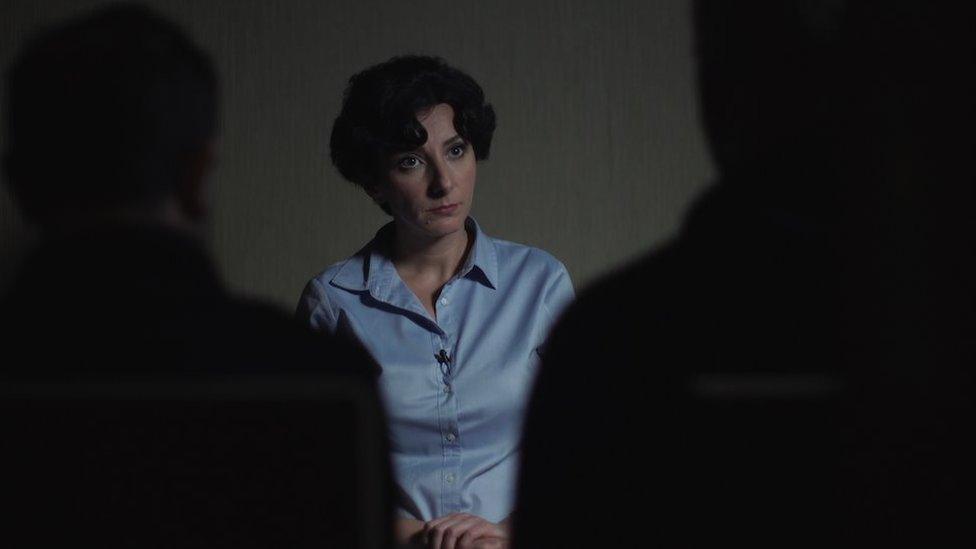
Two Iraqis who worked for the British army spoke on condition of anonymity
"I am frightened. You can feel the threat. At any time, someone will hit the door of my house and shoot five bullets," Ali says. "One bullet for me, one bullet for my wife and three bullets for my three daughters."
Ali (not his real name) is terrified that Iraqi militiamen will target him and his family because he worked for the British army as an interpreter.
He knew it would be dangerous work, but he says he was happy to do it out of a sense of patriotism.
But when the US assassinated top Iranian military commander Qasem Soleimani, as well as a senior Iraqi militia leader, Abu Mahdi al-Muhandis, Ali's work suddenly became far more dangerous. He no longer works for the coalition forces, and feels abandoned to his fate by the British, as they withdraw from Iraq.
I meet Ali and his colleague Ahmed (also not his real name) in the safety of a hotel in Baghdad, on the condition of anonymity.
They look frightened.
"We didn't know where to go or who to turn to. We have come to the BBC and all we want is that the British people and the UK government hear our voices, our story," Ali says.
'One big family'
When they began to work with the British army in Iraq two years ago, they say they were told that they were now members of one big family. That was enough for them to feel a deep commitment to their foreign partners.
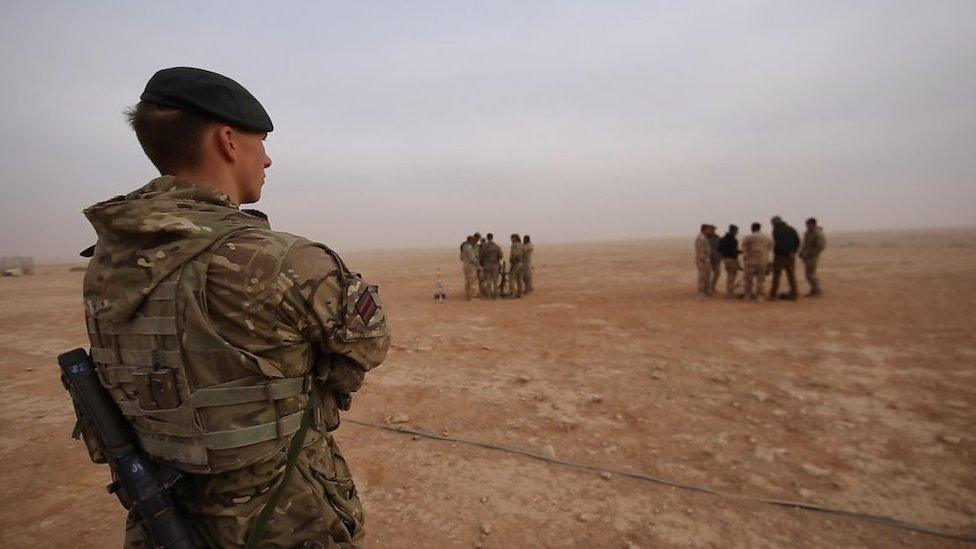
Iraqi security forces in training
They were part of a group of eight interpreters who worked with the British special forces that had come to Iraq under the US-led international coalition against the Islamic State (IS) group.
The UK's Ministry of Defence says that over a six-year period, British troops helped train more than 120,000 Iraqi and Kurdish soldiers. The interpreters were helping British advisers who had been deployed to one of the coalition's major bases to provide training for Iraqi special forces.
But sometimes they would do far more than just translate, Ahmed says. He told me that if the British soldiers were concerned about the safety of the camp, the interpreter would do reconnaissance around the perimeter of the camp to check out any danger. Ahmed says he felt proud to do this job.
"They were telling us, 'guys, don't put yourself in danger,' but we were telling them, 'you are our brothers and we want to keep you safe,'" Ahmed says. "We love our country and they had come to help our country, so for us it was an honour to work with them."
'Targets'
But in January this year, everything changed. On the orders of Donald Trump, Iran's most powerful military commander, Qasem Soleimani, and his Iraqi ally, Abu Mahdi al-Muhandis, deputy chief of Popular Mobilisation forces (PM), were assassinated in Baghdad, angering the country's powerful Iran-backed paramilitaries.
Western troops became targets and the Iraqis they worked with were branded traitors.
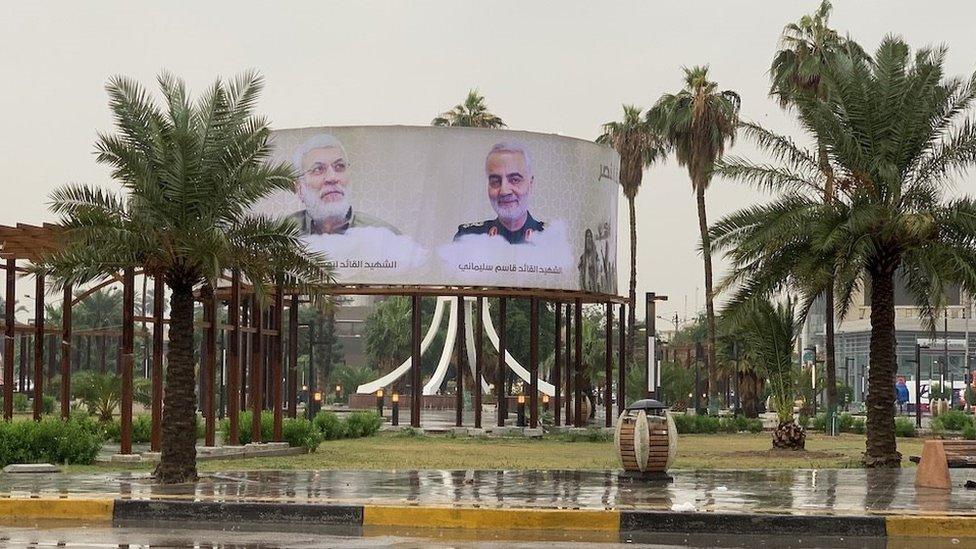
Abu Mahdi al-Muhandis (left) and Qasem Soleimani (right) were killed in a US strike in January
"The atmosphere became very tense. Even some of the Iraqi forces that were being trained by the coalition started to treat us like an enemy. I don't know, maybe because they were loyal to another country rather than Iraq," Ali says.
Coalition bases now came under regular rocket attack, mainly claimed by unknown militia groups.
Many experts believe these new groups are just a front for powerful well-known Shia militia groups such as Kataib Hezbollah, in order to operate with more freedom.
"We have evidence that these groups are just new brands for the same core anti-western Iran-backed militia. They know that hunting a ghost is not possible so they use this strategy to terrorise both Iraqis and coalition troops, while the main militia can get away with only saying that they don't know who these groups are," a US official tells me.
He says that these shadowy groups have now focused on Iraqis who work for the coalition, rather than the coalition forces itself.
'Ghost militias'
Unknown militia groups have issued several warnings, telling Iraqis who are working with coalition forces to leave their jobs immediately.
One of them calls itself Ashab Al Kahf or Companions of the Cave. It has claimed responsibility for many rocket attacks on coalition bases and the US embassy in Baghdad.
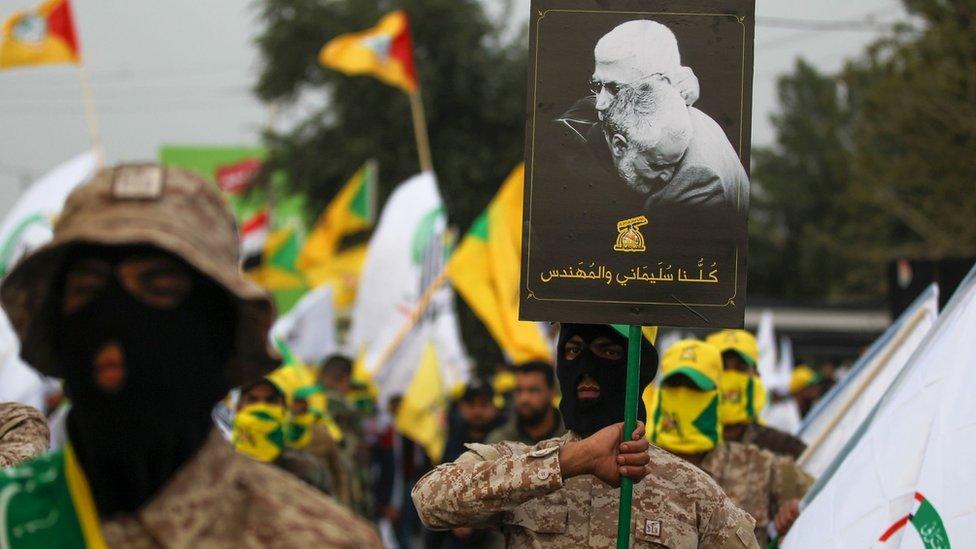
Kataib Hezbollah militia fighters mourn the deaths of al-Muhandis and Soleimani
The group posted a statement on Telegram offering money to Iraqi interpreters who work with the US-led coalition.
"Today we offer forgiveness to those who did wrong to themselves and their country by serving the Americans and British and other enemies of Iraq... We will provide you a monthly salary and safety if you get in touch with us," the statement reads.
The "salaries" they offered start from $3,000 for translators and up to $50,000 for those who are helping the US and British intelligence services.
"There was a hidden message," says Ahmed. "If you don't co-operate with us, we'll consider you an enemy. The difference between us and the coalition is they hit them with Katyusha rockets, but they will kill us with a bullet."
Attacks
These words have already been translated into action - since Soleimani's assassination, several logistical convoys carrying coalition cargos in Iraq have been attacked by improvised explosive devices.
The "ghost militias" post videos on social media after the attacks, joyously claiming responsibility for targeting a "US army convoy".
In fact these convoys are run by contractors and their drivers are Iraqi - there are no US or coalition personnel accompanying them.
"We could see that they have started to execute their threats," Ahmed tells me.
Despite this, the interpreters continued to work with coalition forces. It was a dangerous job but they felt they had some level of protection. They had been assured that their personal data would never leave the coalition.
"No-one knows where I work or what I do, not my kids or my neighbours, only my wife - and even she doesn't know what I do exactly. And we were promised that our information would remain secret," Ali says.
Unemployed, exposed and unsafe
But another storm was yet to come: Covid-19. Once the coronavirus arrived in Iraq, the country went into full lockdown.
Anyone who needed to travel had to be on a special permission list issued by the Iraqi government, which was sent to all checkpoints across Iraq.
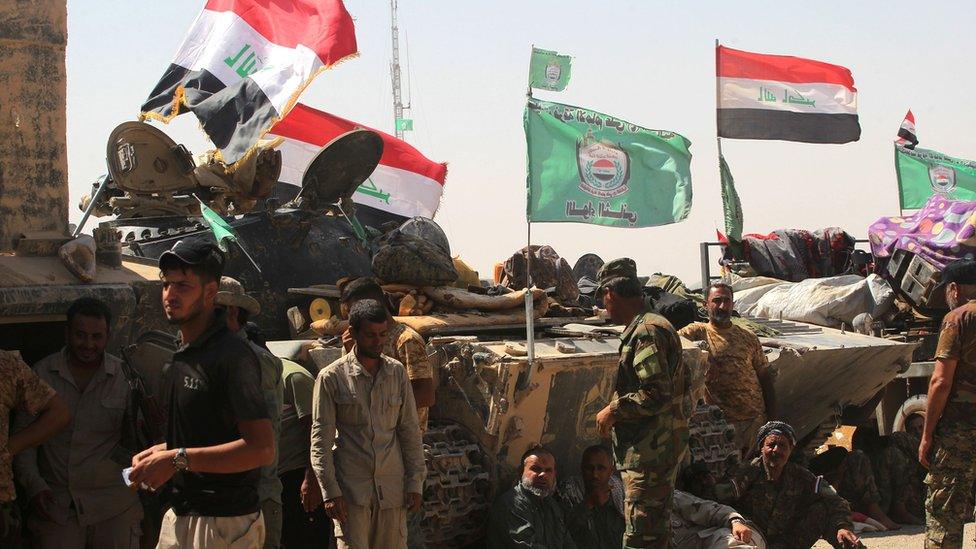
The translators fear that their personal information has fallen into the hands of Iran-backed Shia militias
A list - which has been seen by the BBC - was shared by Iraqi security forces. It contained the full names, job titles, ID numbers and car registrations of all eight interpreters in Ali and Ahmed's group.
The eight were informed by email that this list had been sent to Iraqi checkpoints to "facilitate their movement". It was terrifying news.
In Iraq, checkpoints are jointly manned by different security units, including the PMs, which includes powerful anti-US Shia armed groups.
"It meant that the militia has our information," Ahmed says.
With continued rocket attacks and now Covid, most of the training programs by the coalition had already been halted and the process of handing over bases to Iraqis began in earnest.
From mid-March 2020, the coalition handed over eight bases to the Iraqis, and significantly reduced troop numbers.
One of the bases was the one where Ahmed and Ali were working, and as the drawdown began, the British special forces that they worked with left Iraq earlier than planned.
Now Ahmed, Ali and their six colleagues were unemployed, and felt exposed and unsafe.
The situation forced them to hide and they moved their families to different addresses - but this can only be a temporary solution. Ali fears that, in time, the militia will catch up with them.
"It's like I am carrying my heart in a jar full of blood - if I trip and fall, it will break and I will die," Ali says.
Personal data
I raise their predicament with the coalition's British deputy commander, Major General Kev Copsey. He denies that Iraqi interpreters' information was shared with others.
"Like everyone we work with - the interpreters provide us with a vital connectivity for us to be able to do our work here and as a result we protect their personal data and we do not pass that information on to other services, including the Iraqi security forces or government."
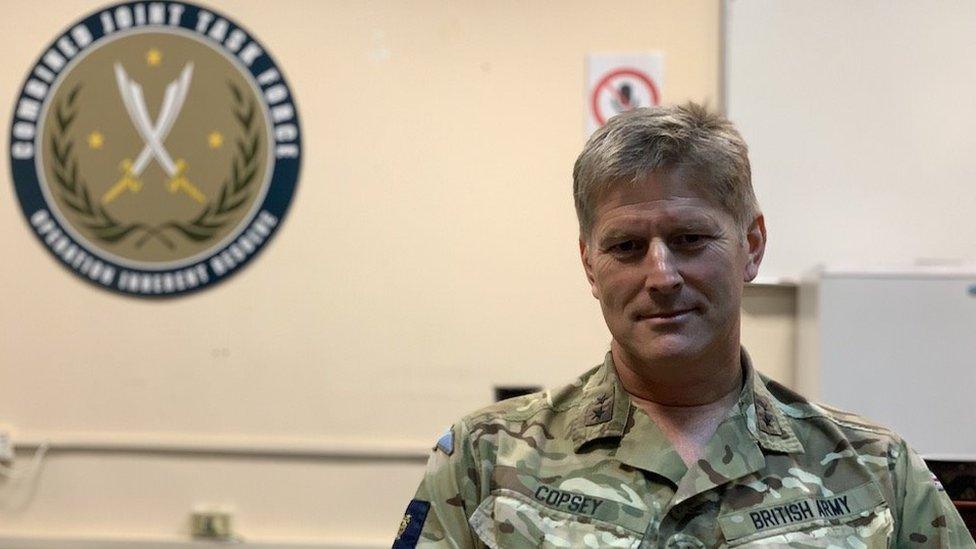
Major General Kev Copsey insists that the personal information of contractors is not shared
But when I tell him that we have seen the document and it looks genuine, he promises that he will follow it up.
"I find it an interesting story irrespective of the validity of it… I would have to look into that further," he says.
The British Ministry of Defence have confirmed that investigations are ongoing.
"While we do not employ interpreters in Iraq directly, we take any breach of personal security extremely seriously," a statement read.
"We hold our contractors to the highest standards and are currently investigating the allegations."
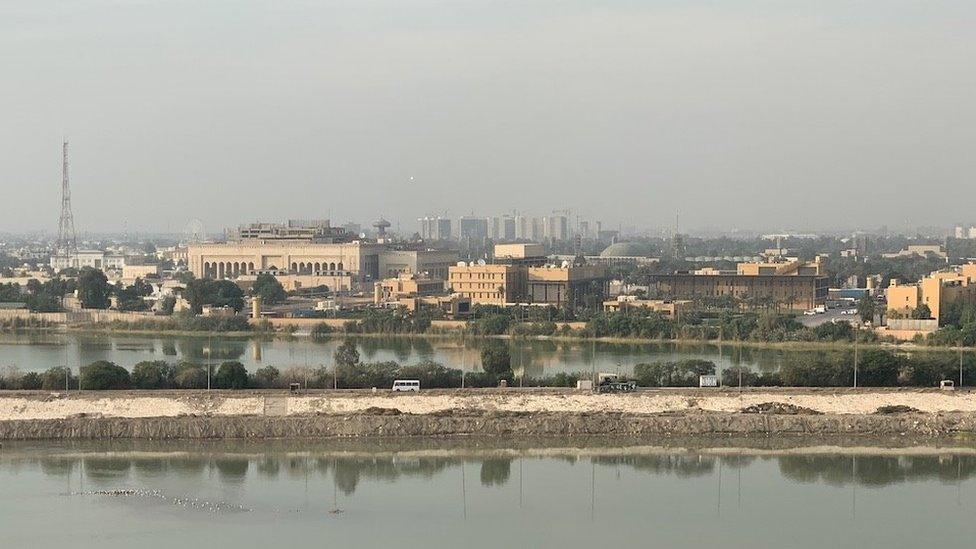
Liaison between the coalition forces and the Iraqi government is conducted through the US embassy in Baghdad
The document has the header of the US embassy in Baghdad. Ahmed explains that as it is a US-led coalition, any administrative correspondence with Iraqi authorities comes from the US embassy.
We contacted the US embassy, asking them about this document.
"As a general matter, we do not comment on our private diplomatic correspondence with the Government of Iraq. That said, coordinating logistics movements with the Government of Iraq is a standard procedure to seek to ensure the safety and security of the US Mission and US Mission personnel in Iraq," an embassy spokesperson replied.
Threats against Iraqi interpreters have a long history. Since the fall of Saddam Hussein, at least 40 who worked with the British army have been murdered by militia groups.
Despite the constant threats in the years following the US-led invasion of 2003, the UK refused to offer a blanket visa programme covering interpreters working with the British army.
In a report published in February 2019 on the Home Office website on "perceived collaboration" in Iraq, it is argued that the level of risk for Iraqi interpreters is now low, given the fact that most Iran-backed anti-Western militia are busy with their internal struggles, as well as fighting with IS.
It is certainly true that during the campaign against IS, I witnessed a lot of indirect collaboration between pro-Iran groups and the US-led coalition.
But the situation has clearly changed since the killing of Soleimani and al-Muhandis.
Ahmed and Ali can no longer feel safe. They are worried that their names will be added to the long list of interpreters murdered in Iraq.
"I trusted them, they trusted me. I wasn't expecting they would leave us like this. No offence to anyone - but where are our human rights?" Ali tells me with a lump in his throat. Ahmed nods solemnly.